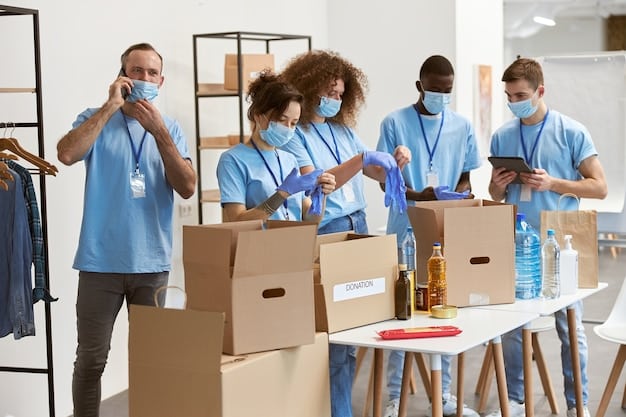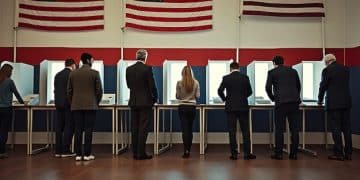US Vaccine Diplomacy: Strengthening International Relations During the Pandemic

US vaccine diplomacy during the pandemic involves donating and distributing vaccines globally to strengthen international relations, address global health inequities, and counter geopolitical rivals’ influence, showcasing US commitment to global health security.
The COVID-19 pandemic has presented unprecedented challenges to global health and international relations. One significant response strategy has been how is the US engaging in vaccine diplomacy to strengthen international relations during the ongoing pandemic?, a multifaceted approach that underscores the nation’s commitment to global health security and its strategic geopolitical goals.
Understanding Vaccine Diplomacy
Vaccine diplomacy refers to the practice of using the distribution and donation of vaccines to improve a country’s diplomatic relations and public image. During the COVID-19 pandemic, this strategy has become increasingly prominent as nations compete to secure vaccine supplies and extend their influence.
The Strategic Importance of Vaccine Diplomacy
Vaccine diplomacy extends beyond mere altruism; it’s a strategic tool that nations use to enhance their soft power, foster alliances, and secure future cooperation. The US approach is particularly tailored to address global health inequities while advancing its diplomatic interests.
The US leverages vaccine diplomacy to:
- Strengthen bilateral relations with key allies and partners.
- Counter the influence of geopolitical rivals like China and Russia.
- Promote global health security and prevent future pandemics.
In conclusion, understanding the core principles and strategic goals is essential for evaluating the effectiveness and impact of US vaccine diplomacy.

Key Initiatives of US Vaccine Diplomacy
The US has launched several key initiatives to distribute vaccines globally, primarily focusing on regions with limited access and high need. These initiatives are central to understanding the depth and breadth of US engagement during the pandemic.
COVAX and Global Vaccine Distribution
The US is a major contributor to COVAX, a global initiative aimed at equitable access to COVID-19 vaccines. Through COVAX, the US has pledged billions of dollars and millions of vaccine doses to support countries in need.
Bilateral Donations and Partnerships
In addition to COVAX, the US has engaged in bilateral donations of vaccines to specific countries, often prioritizing strategic partners and allies. These donations are accompanied by technical and logistical support to ensure effective vaccine deployment.
- Direct donations of vaccine doses to countries in Latin America, Asia, and Africa.
- Partnerships with international organizations like the WHO and UNICEF.
- Financial and logistical support for vaccine administration and infrastructure.
These initiatives collectively represent a significant effort by the US to address global vaccine inequity and foster goodwill through tangible assistance.
Impact on International Relations
US vaccine diplomacy has had a multifaceted impact on international relations, influencing perceptions of US leadership and shaping alliances. This diplomacy has been instrumental in reinforcing existing partnerships and forging new ones.
Strengthening Alliances and Partnerships
Vaccine donations have served as a powerful tool for strengthening alliances and reinforcing existing partnerships. By providing essential resources, the US demonstrates its commitment to mutual support and cooperation.
Countering Geopolitical Influence
US vaccine diplomacy aims to counter the influence of geopolitical rivals such as China and Russia, who have also engaged in vaccine diplomacy. The US seeks to offer a more transparent and equitable approach, differentiating itself from its competitors.
- Reinforcing trust and goodwill with partner nations.
- Promoting a positive image of US leadership on the global stage.
- Creating opportunities for future collaboration in various sectors.
Analyzing the successes and challenges of US vaccine diplomacy provides insights into its long-term impact on global relations and leadership.

Challenges and Criticisms
Despite its positive impacts, US vaccine diplomacy faces several challenges and has drawn criticism from various quarters. Addressing these concerns is crucial for improving the strategy’s effectiveness and legitimacy.
Addressing Vaccine Inequity
One of the primary challenges is addressing vaccine inequity. Critics argue that despite its efforts, the US and other wealthy nations have not done enough to ensure equitable access to vaccines for all countries.
Balancing Domestic Needs with Global Commitments
Balancing domestic needs with global commitments is another significant challenge. The US must ensure its own population is vaccinated while also fulfilling its pledges to international partners.
- Ensuring equitable distribution of vaccines worldwide.
- Addressing concerns about vaccine nationalism.
- Improving transparency and communication in vaccine distribution efforts.
These challenges highlight the complexities of vaccine diplomacy and the need for ongoing assessment and improvement.
The Future of US Vaccine Diplomacy
The future of US vaccine diplomacy will likely involve adapting to evolving global health needs and geopolitical dynamics. Strategic adjustments will be necessary to ensure the continued effectiveness and relevance of the strategy.
Adapting to Evolving Global Health Needs
As the pandemic evolves, US vaccine diplomacy must adapt to address new variants, vaccine hesitancy, and logistical challenges. This requires flexibility and innovation in vaccine delivery strategies.
Strengthening International Cooperation
Strengthening international cooperation is essential for long-term success. The US can work more closely with international organizations, partner nations, and the private sector to enhance vaccine production, distribution, and administration.
- Investing in research and development of new vaccines and treatments.
- Establishing robust monitoring and evaluation systems.
- Fostering greater collaboration between governments, NGOs, and the private sector.
These future directions underscore the ongoing importance of US vaccine diplomacy in shaping global health security and international relations.
Case Studies: Successes and Failures
Examining specific case studies of US vaccine diplomacy reveals valuable lessons about what works and what doesn’t. Analyzing these examples can help refine future strategies and improve outcomes.
Success Stories: Countries Benefiting from US Aid
Several countries have significantly benefited from US vaccine donations, experiencing improved public health outcomes and strengthened diplomatic ties. These success stories demonstrate the positive potential of vaccine diplomacy.
Failures and Areas for Improvement
Conversely, some efforts have faced challenges, resulting in limited impact or even negative perceptions. Identifying these failures is crucial for learning from mistakes and improving future initiatives.
- Analyzing the impact of US vaccine donations on specific countries.
- Identifying factors contributing to successful and unsuccessful outcomes.
- Recommending strategies for improving vaccine delivery and administration.
By studying these case studies, the US can gain valuable insights into optimizing its vaccine diplomacy efforts and maximizing their impact.
| Key Point | Brief Description |
|---|---|
| 🤝 Strengthening Relations | US vaccine donations enhance partnerships and trust with other nations. |
| 🌍 Global Health Security | Vaccine diplomacy prevents future pandemics and protects global health. |
| 💉 Vaccine Inequity | Addressing disparities in vaccine access remains a critical challenge. |
| 🛡️ Countering Influence | US efforts aim to offer a more equitable approach compared to rivals. |
Frequently Asked Questions
▼
Vaccine diplomacy is the use of vaccine distribution to strengthen diplomatic relations and enhance a country’s global image. It involves donating or providing vaccines to other nations to foster goodwill and collaboration.
▼
The US engages in vaccine diplomacy to promote global health security, strengthen alliances, counter geopolitical rivals, and demonstrate leadership in addressing global challenges like the COVID-19 pandemic.
▼
It improves relations by building trust and cooperation with recipient countries, enhancing the US’s reputation as a reliable partner. This can lead to stronger diplomatic ties and increased collaboration on various issues.
▼
Challenges include addressing vaccine inequity, balancing domestic needs with global commitments, and countering criticism of vaccine nationalism. Transparency and equitable distribution are crucial for overcoming these challenges.
▼
COVAX is a global initiative for equitable vaccine access. The US supports COVAX through financial contributions and vaccine donations, ensuring that low- and middle-income countries receive COVID-19 vaccines to protect their populations.
Conclusion
In conclusion, US vaccine diplomacy represents a significant effort to leverage vaccine distribution to strengthen international relations and promote global health security. While challenges remain, the strategic use of vaccines continues to shape alliances and reinforce US leadership on the global stage. The ongoing assessment and refinement of these strategies are crucial for maximizing their impact and ensuring equitable access to vaccines worldwide.





